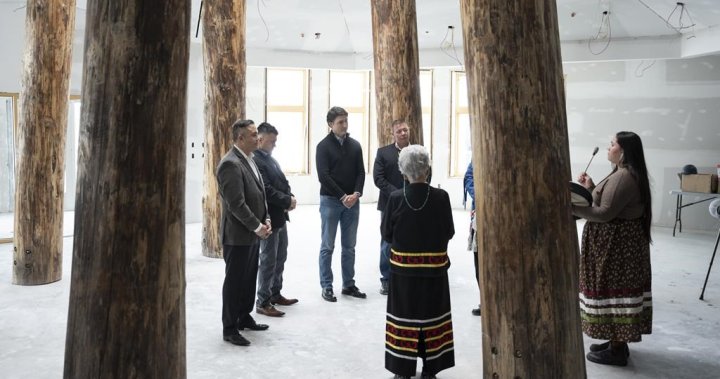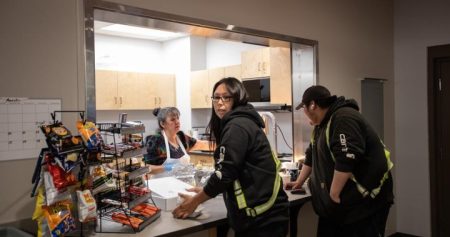Nova Scotia is opening the first long-term care facility in a First Nations community in the province. The 48-room facility, named Kiknu, meaning “our home” in Mi’kmaq, is located in the Cape Breton Mi’kmaq community of Eskasoni. The home will provide culturally responsive services to Mi’kmaq seniors from across the province. The design and care-management plan of the facility were influenced by discussions with Eskasoni elders, ensuring that the needs and values of the community are respected. The facility is owned by the First Nation and will be operated in partnership with private long-term care provider Shannex. Construction of the facility was supported by a $19.6 million contribution from Ottawa and $11.6 million from the province. Residents are scheduled to start moving in on April 23.
The opening ceremony for the new long-term care facility in Eskasoni marks an important milestone for First Nations communities in Nova Scotia. By establishing a facility that offers culturally responsive care to Mi’kmaq seniors, the province is taking steps to address the unique needs and values of Indigenous populations. The involvement of Eskasoni elders in shaping the design and care-management plan of the facility demonstrates a commitment to respecting the traditions and knowledge of the community. The partnership between the First Nation and Shannex, a private long-term care provider, reflects a collaborative approach to operating the facility and ensuring that residents receive high-quality care.
The construction of the long-term care facility in Eskasoni was made possible by significant funding from both the federal government and the province. Ottawa contributed $19.6 million towards the project, while the province provided $11.6 million. This financial support demonstrates a commitment to improving access to long-term care services for Indigenous populations and addressing the unique challenges faced by First Nations communities. By investing in the development of this facility, the government is prioritizing the health and well-being of Mi’kmaq seniors and ensuring that they have access to culturally appropriate care in their own community.
The opening of the Kiknu long-term care facility in Eskasoni represents a significant achievement for the Mi’kmaq community and a positive step towards improving healthcare services for Indigenous populations in Nova Scotia. The facility will provide a supportive and culturally sensitive environment for Mi’kmaq seniors, allowing them to access the care they need while remaining connected to their language, traditions, and community. The involvement of both the federal government and the province in supporting the construction of the facility signals a commitment to working collaboratively with First Nations communities to address healthcare disparities and improve outcomes for Indigenous peoples.
The new long-term care facility in Eskasoni is scheduled to start accepting residents on April 23, marking the beginning of a new chapter in healthcare services for Mi’kmaq seniors in Nova Scotia. The facility’s opening ceremony celebrated this important milestone and highlighted the significance of providing culturally responsive care to Indigenous populations. By working in partnership with the Mi’kmaq community and private sector providers, the province is demonstrating a commitment to innovative and inclusive healthcare solutions that prioritize the well-being of all residents. The Kiknu facility represents a model for culturally sensitive and community-driven long-term care services that can be replicated in other First Nations communities across Canada.
Overall, the opening of the Kiknu long-term care facility in Eskasoni is a positive development for Mi’kmaq seniors in Nova Scotia and a testament to the importance of culturally responsive care for Indigenous populations. The facility’s unique design and care-management plan, guided by the input of Eskasoni elders, demonstrates a commitment to honoring the traditions and values of the Mi’kmaq community. With significant financial support from both the federal government and the province, the facility is well-positioned to provide high-quality care to residents while fostering a sense of connection to their culture and community. The collaboration between the First Nation, private sector partners, and government entities sets a strong example for advancing healthcare services for Indigenous populations and working towards health equity for all Canadians.















